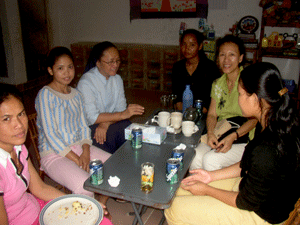Changing Hats by Frances Lew
In the midst of Pohchengtong Industrial site, surrounded by low cost dwellings is a centre run by Sr. Sol Delicia Lara, Daughters of Charity. The main industry is garment manufacturing and these factories employ local female workers as well as those from the provinces. Sr. Sol runs the centre with the help of five staff including Bun, the tut tut driver. The locals in the vicinity know the centre as 'Jesus Centre'. The Pohchengtong Industrial site is about 2 km north of Phnom Penh's International airport. As the route goes through a number of suburban townships, the traffic is fairly heavy. It's amazing to see the number of Lexus, Mercedes, trucks, other vehicles as well as tut tuts and motor dops squeezing and elbowing their way in and out of the traffic. The tut tuts and the motor dops are the 'public vehicles' in Phnom Penh. The pedestrians and vehicle drivers observe their own traffic rules when it comes to crossing the road. Despite the seemingly chaotic traffic situation, there are hardly any traffic accidents. What a feat!
Leaving the tar road, Bun turns into a dirt road. As we bounce along, clasping handkerchiefs over our mouths and noses, as the trucks, cars, tut tuts and motor cycles kick up a whirl of fine yellow sand as the vehicles rush by. This goes on for about 2 km and you get to see another facet of life- simple makeshift stalls that sells all kinds of food and goods that sustains a community. Overall, the ride from home to the centre takes about 45 minutes and it is always an experience. You have to see it to believe it.
The Centre is a no frill building with three multi-purpose rooms and a kitchen. About thirty factory workers and their children have their meals at the centre for a minimum sum, six days a week. Classes in Khmer and English are conducted for these children and those living in the vicinity. The Centre has recently started a crèche.
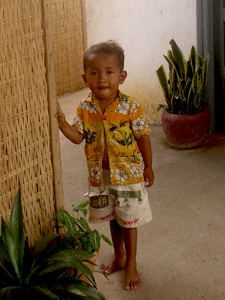
There is four staff minus Bun managing the centre. They are young and they wear more than one hat – cooking for the factory workers and the children, being nannies, running the crèche and teaching the children Khmer and English. The staff has not had any training in teaching. Hence, sessions on the teaching of rhymes, Shared Book Approach, criteria for the selection of Big Books and teaching practices were arranged for the staff. These covered five sessions.
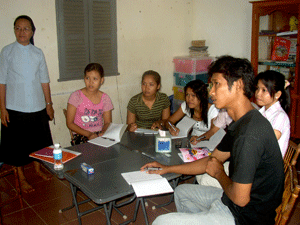
It was refreshing to see how the 'trainee teachers' looked forward to the sessions. Though they are not proficient in English, they are willing and hard working. Either Sr. Sol or Ros would stand in as the translator when the need arises. On my part, I had to remember to use simple English and to speak slowly. See how engrossed they are working on how they would use the books they had selected. "Ä study in concentration"
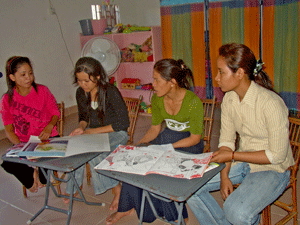
It is heartening to see how the children are drawn to the "Jesus Centre". However, it is not surprising if you could see their living quarters, a one-room dwelling with a toilet usually shared by four factory workers. They share a big table-like bed too.
Sophe had joined her teachers though all the kids were told specifically that the teachers were having class and they were to stay home.
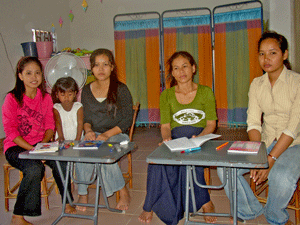
Sr. Sol taking a break from her administrative duties had come in to encourage her staff and looked on as they continued with their discussion.
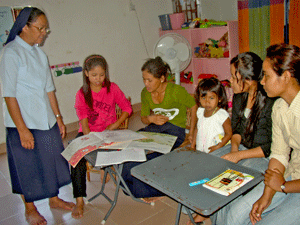
A group of five kids had turned up at the Centre and then another four. What are we to do with them? Shall we send them home?
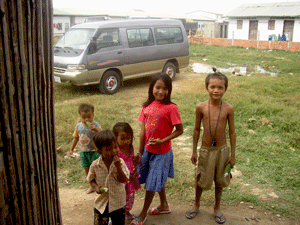
Instead of turning the uninvited kids away, we agreed that we would take the opportunity for the teachers to put into practice the strategies that they had learned. Ros Reduol taught the children the rhyme "Ten little children", adapted from "Ten little Indian Boys" with the help of Kolam and Leakena. At the end of the poetry lesson, the children chorused, "It is fun".
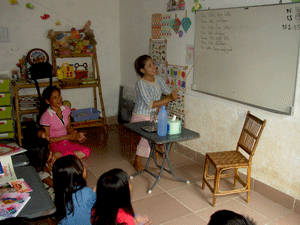
After the poetry lesson, the children left the centre. No doubt, they would have loved to stay on.
Then it was Kakha and Kolam's turn to demonstrate the use of their selected Big book, 'The Animals at the Zoo".
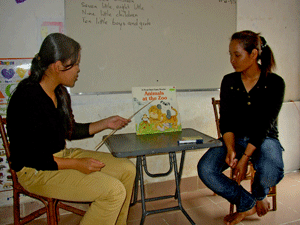
What animal will you see next? Kakha asked.
A snake.
What makes you say it's a snake?
I can see it's wings. No, I mean tail. Everyone laughed.
The 'students' and the teacher had a lively and experiential session sharpening their newly acquired skills and with much laughter thrown in. (10207)
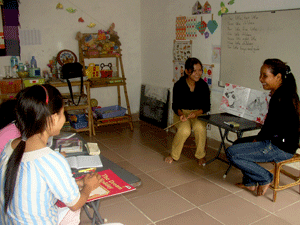
After the session, the staff changed hats and went about their other duties. Kakha who doubles up as cook is seen in the kitchen.
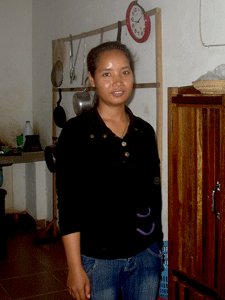
As it was the last session, Sr. Sol prepared a tea reception for all the participants.
It had been a fulfilling 'five sessions', working with the band of four. I have learned much from them if not more than they have learned from me. It is also a humbling experience for me to see how they thirst to improve and upgrade themselves so that they can be better teachers to their students. Even more humbling for me is their dedication and conscientiousness in carrying out their duties – changing hats in their stride.
